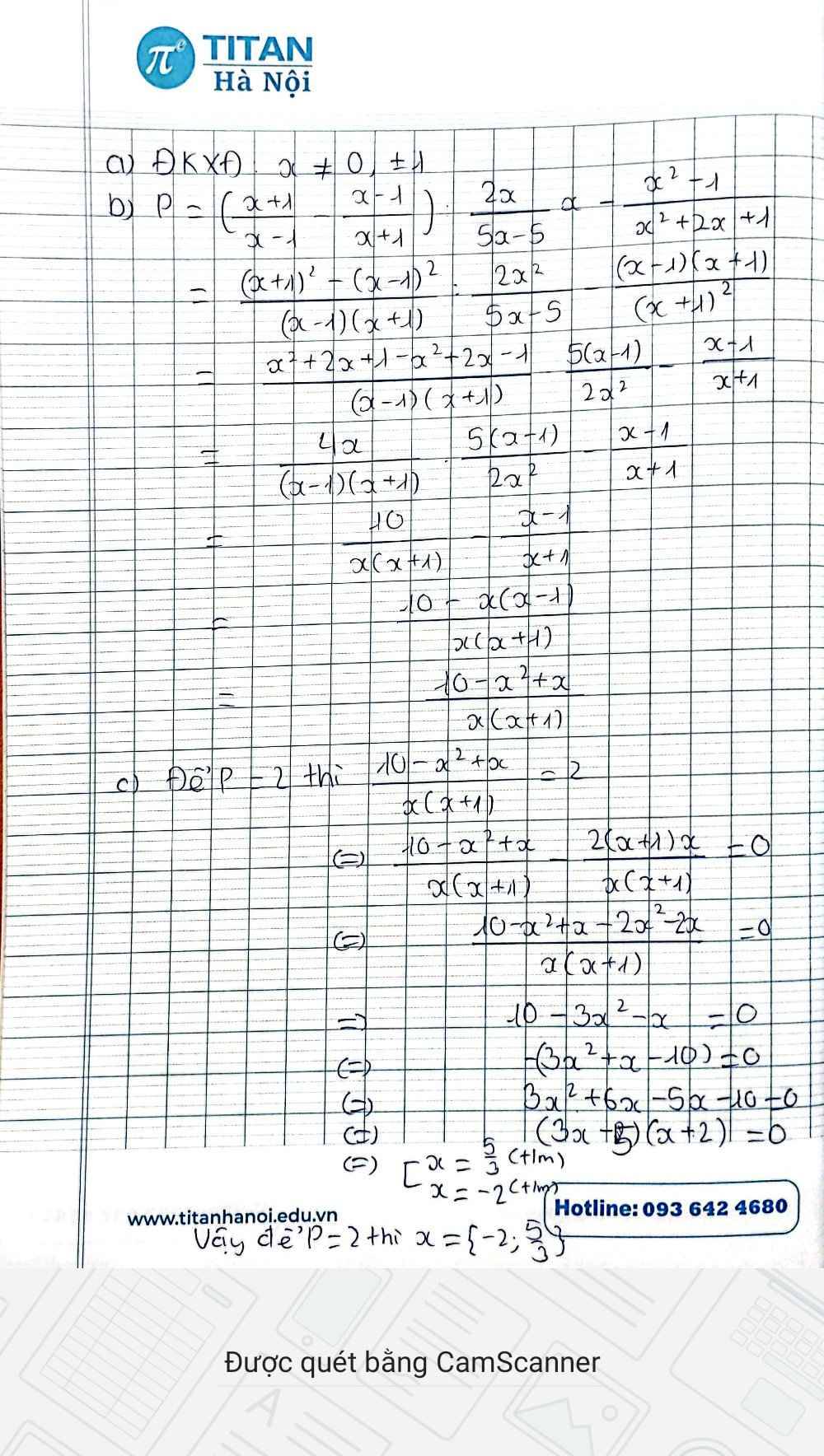Hãy nhập câu hỏi của bạn vào đây, nếu là tài khoản VIP, bạn sẽ được ưu tiên trả lời.

a, Với \(x=3\)\(=>A=\frac{x-1}{2}=\frac{3-1}{2}=\frac{2}{2}=1\)
Vậy A = 1 khi x = 3
b, Ta có : \(B=\frac{1}{x}-\frac{x}{2x+1}+\frac{2x^2-3x-1}{x\left(2x+1\right)}\)
\(=\frac{2x+1}{x\left(2x+1\right)}-\frac{x^2}{x\left(2x+1\right)}+\frac{2x^2-3x-1}{x\left(2x+1\right)}\)
\(=\frac{x^2-3x+2x+1-1}{x\left(2x+1\right)}=\frac{x^2-x}{x\left(2x+1\right)}=\frac{x\left(x-1\right)}{x\left(2x+1\right)}=\frac{x-1}{2x+1}\)
Ta có : \(A=\frac{x-1}{2};B=\frac{x-1}{2x+1}\)
\(=>C=A:B=\frac{x-1}{2}:\frac{x-1}{2x+1}=\frac{2x+1}{2}=x+\frac{1}{2}\)
đề sai bạn ơi

\(A=\dfrac{2x\left(x+1\right)\left(x-2\right)^2}{x\left(x-2\right)\left(x+2\right)\left(x+1\right)}=\dfrac{2\left(x-2\right)}{x+2}\\ A=\dfrac{2\left(\dfrac{1}{2}-2\right)}{\dfrac{1}{2}+2}=\dfrac{2\left(-\dfrac{3}{2}\right)}{\dfrac{5}{2}}=\left(-3\right)\cdot\dfrac{2}{5}=-\dfrac{6}{5}\)
\(B=\dfrac{x\left(x^2-xy+y^2\right)}{\left(x+y\right)\left(x^2-xy+y^2\right)}=\dfrac{x}{x+y}=\dfrac{-5}{-5+10}=\dfrac{-5}{5}=-1\)

a: ĐKXĐ: x<>2; x<>-2; x<>0; x<>3
b: \(P=\left(\dfrac{-\left(x+2\right)}{x-2}+\dfrac{4x^2}{\left(x-2\right)\left(x+2\right)}+\dfrac{x-2}{x+2}\right)\cdot\dfrac{x^2\left(2-x\right)}{x\left(x-3\right)}\)
\(=\dfrac{-x^2-4x-4+4x^2+x^2-4x+4}{\left(x-2\right)\left(x+2\right)}\cdot\dfrac{-x\left(x-2\right)}{x-3}\)
\(=\dfrac{4x^2-8x}{\left(x+2\right)}\cdot\dfrac{-x}{\left(x-3\right)}=\dfrac{-4x^2\left(x-2\right)}{\left(x+2\right)\left(x-3\right)}\)
c: 2(x-1)=6
=>x-1=3
=>x=4
Thay x=4 vào P, ta đc:
\(P=\dfrac{-4\cdot4^2\cdot\left(4-2\right)}{\left(4+2\right)\left(4-3\right)}=\dfrac{-64\cdot2}{6}=\dfrac{-128}{6}=-\dfrac{64}{3}\)

Bổ sung phần c và d luôn:
c, C = \(\dfrac{2}{5}\)
\(\Leftrightarrow\) \(\dfrac{x^2-1}{2x^2+3}\) = \(\dfrac{2}{5}\)
\(\Leftrightarrow\) 5(x2 - 1) = 2(2x2 + 3)
\(\Leftrightarrow\) 5x2 - 5 = 4x2 + 6
\(\Leftrightarrow\) x2 = 11
\(\Leftrightarrow\) x2 - 11 = 0
\(\Leftrightarrow\) (x - \(\sqrt{11}\))(x + \(\sqrt{11}\)) = 0
\(\Leftrightarrow\) \(\left[{}\begin{matrix}x-\sqrt{11}=0\\x+\sqrt{11}=0\end{matrix}\right.\)
\(\Leftrightarrow\) \(\left[{}\begin{matrix}x=\sqrt{11}\left(TM\right)\\x=-\sqrt{11}\left(TM\right)\end{matrix}\right.\)
d, Ta có: \(\dfrac{x^2-1}{2x^2+3}\) = \(\dfrac{x^2+\dfrac{3}{2}-\dfrac{5}{2}}{2\left(x^2+\dfrac{3}{2}\right)}\) = \(\dfrac{1}{2}\) - \(\dfrac{5}{4\left(x^2+\dfrac{3}{2}\right)}\)
C nguyên \(\Leftrightarrow\) \(\dfrac{5}{4\left(x^2+\dfrac{3}{2}\right)}\) nguyên \(\Leftrightarrow\) 5 \(⋮\) 4(x2 + \(\dfrac{3}{2}\))
\(\Leftrightarrow\) 4(x2 + \(\dfrac{3}{2}\)) \(\in\) Ư(5)
Xét các TH:
4(x2 + \(\dfrac{3}{2}\)) = 5 \(\Leftrightarrow\) x2 = \(\dfrac{-1}{4}\) \(\Leftrightarrow\) x2 + \(\dfrac{1}{4}\) = 0 (Vô nghiệm)
4(x2 + \(\dfrac{3}{2}\)) = -5 \(\Leftrightarrow\) x2 = \(\dfrac{-11}{4}\) \(\Leftrightarrow\) x2 + \(\dfrac{11}{4}\) = 0 (Vô nghiệm)
4(x2 + \(\dfrac{3}{2}\)) = 1 \(\Leftrightarrow\) x2 = \(\dfrac{-5}{4}\) \(\Leftrightarrow\) x2 + \(\dfrac{5}{4}\) = 0 (Vô nghiệm)
4(x2 + \(\dfrac{3}{2}\)) = -1 \(\Leftrightarrow\) x2 = \(\dfrac{-7}{4}\) \(\Leftrightarrow\) x2 + \(\dfrac{7}{4}\) = 0 (Vô nghiệm)
Vậy không có giá trị nào của x \(\in\) Z thỏa mãn C \(\in\) Z
Chúc bn học tốt! (Ko bt đề sai hay ko nữa :v)

a: \(M=\left(\dfrac{\left(x-1\right)\left(x+1\right)}{2\left(x-1\right)\left(x+1\right)}-\dfrac{\left(x+3\right)\left(x-1\right)}{2\left(x+1\right)\left(x-1\right)}\right):\dfrac{x-1-x+3}{x-1}\)
\(=\dfrac{x^2-1-x^2-2x+3}{2\left(x-1\right)\left(x+1\right)}\cdot\dfrac{x-1}{2}\)
\(=\dfrac{-2x+2}{2\left(x+1\right)}\cdot\dfrac{1}{2}=\dfrac{-x+1}{2}\)
b: Thay x=-1/2 vào M, ta được:
\(M=\dfrac{\dfrac{1}{2}+1}{2}=\dfrac{3}{2}:2=\dfrac{3}{4}\)
a, \(M=\left(\dfrac{x^2-1-\left(x+3\right)\left(x-1\right)}{2\left(x-1\right)\left(x+1\right)}\right):\left(\dfrac{x-1-x+3}{x-1}\right)\)
\(=\left(\dfrac{-1+x-3x-3}{2\left(x-1\right)\left(x+1\right)}\right):\dfrac{2}{x-1}=\dfrac{-2x-4}{2\left(x-1\right)\left(x+1\right)}:\dfrac{2}{x-1}=\dfrac{-\left(x+2\right)}{2\left(x+1\right)}\)
b, Thay x =-1/2 vào ta đc
\(-\dfrac{\left(\dfrac{-1}{2}+2\right)}{2\left(-\dfrac{1}{2}+1\right)}=\dfrac{-\dfrac{3}{2}}{2\left(\dfrac{1}{2}\right)}=\dfrac{-3}{2}\)

